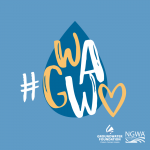
Now through March 14 is National Groundwater Awareness week! What is groundwater and why is it so important? Read on to see how you can protect it!
What is groundwater?
Groundwater is the water found underground in the cracks and spaces in soil, sand and rock. It is stored in and moves slowly through geologic formations of soil, sand and rocks called aquifers.
Why is the protect of groundwater so important?
Life as we know it would be impossible without groundwater. It is the world’s most extracted natural resource, and it supports our ecosystems.
What can you do for National Groundwater Week?
Share. Learn about the importance of groundwater and how the resource impacts lives and share the social media graphics from the Groundwater Foundation (Facebook, Twitter, Instagram) and National Groundwater Association (Facebook, Twitter, Instagram).
Inspire. The next generation of groundwater professionals. Groundwater professionals encompass many different occupations within the industry, including well water drillers, hydrogeologists, engineers, groundwater scientists, and educators. Buy an Awesome Aquifer Kit or get kids involved in tracking water usage via the 30×30 app from The Groundwater Foundation.
Take action! Here are some ideas that protect groundwater this week and all year long!
- Complete your yearly water well testing and well maintenance if you have a private water well.
- Safely store, handle, and use chemicals and fuels. Keep them indoors or covered to prevent rain water from becoming contaminated and washing chemicals into a storm drain.
- Minimize the use of chemicals; always use them according to directions. Consider replacing them with more environmentally and human-friendly options.
- Properly dispose of all waste: don’t dump chemicals down floor drains, sinks, storm sewers or on the ground. Post signs at sinks in regulated areas of your business prohibiting chemical disposal or dumping.
- Keep lids of waste dumpsters closed to prevent rainwater washing materials out of them. Dumpsters should be placed on a hard surface, preferably concrete.
- Conduct indoor or outdoor chemical product transfers only in areas designed for that purpose
